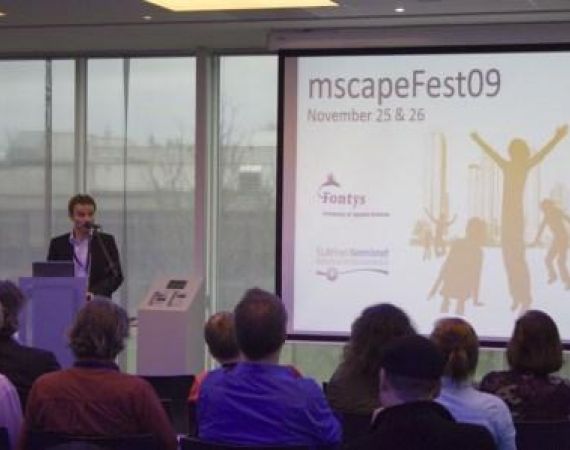Studio blog
Posted on Fri 4 Dec 2009
What happened at mscapeFest09?
Last week I was at in Tilburg, the Netherlands, for the fourth running (yes, I was running it as well) of the successful mscapeFest, a two day conference for mediascape, pervasive, locative and interactive media enthusiasts, practitioners and facilitators. This year it was generously funded by…

Posted by

Vanessa Bellaar Spruijt
Vanessa Bellaar Spruijt is currently a producer on the MyWorld programme, a five year programme which will showcase the latest advances in digital production and research.Last week I was at in Tilburg, the Netherlands, for the fourth running (yes, I was running it as well) of the successful mscapeFest, a two day conference for mediascape, pervasive, locative and interactive media enthusiasts, practitioners and facilitators. This year it was generously funded by Fontys University of Applied Sciences, Technical Teacher Training College in Eindhoven, SurfNET and Kennisnet as well as the Pervasive Media Studio and Calvium.
Last year mscapeFest was hosted in Belfast and two Fontys lecturers (Tom Toebes and Peter Krijnen) were so inspired by the possibilities and potential of mscape that they immediately jumped at the chance to be the hosts for this year’s mscapeFest. They were excellent hosts, the building was airy and had an interesting colour coding system (it is very big). The catering, hospitality and typical Brabant friendliness all added to a pleasant two days.
This year's programme had a major educational focus, as you would expect with the institutions involved. SurfNET and Kennisnet focus a lot on mobile learning and the changes in the learning environment due to employment of technology. SURFnet is part of SURF, the collaborative organisation for higher education institutions and research institutes which are together working on breakthrough innovations in ICT. The Kennisnet foundation encourages and supports the use of ICT in the daily curriculum of primary education, secondary education and vocational training. FLOT and Fontys already use mediascapes in their teaching programmes, especially to teach biology and physics. They hope that their students, who will be future teachers, will use mediascapes as a didactic learning tool in their classes. Tom Toebes from Fontys presented the use of mediascapes in biology, how ICT has changed and what sort of questions arise when using mediascapes in the curriculum. Peter Krijnen hosted a discussion with the question: "How can we achieve cooperation between experts of different disciplines within education?". Martin Bruggink, a mathematics and ICT teacher on a school in The Hague is looking at using mediascapes to teach programming, but the content (assets, story, sounds, etc) would ideally be created in a different teaching class. This could be history mixed with media or ICT or geography, for example.
Attracting a diverse audience, there were primary, secondary and higher education teachers, artists, commercial developers and students. In addition to many new faces mediascape veterans Kevin Coyle and Brian Lamb of Ulster Mediascapes had travelled from Belfast to share their thoughts on the different educational uses of mediascapes, exploring approaches and how this affects the learning experiences derived.
The two day programme was designed to be aimed at engaging the existing community by offering slots for public papers and plenty of network and discussion time. The talks were kicked off by an inspirational keynote Matthijs Leendertse, who is a scientific lecturer at the Erasmus University in Rotterdam and works at TNO (an independent research organisation in The Netherlands, which applies scientific knowledge with the aim of strengthening the innovative power of industry and government). His talk 'Following the Learner', focused on the concept of learning spaces, the ubiquitous learning environment and its challenges. The public papers ranged from a mediascape designed for aiding history lessons, an exploration of moving image and user involvement in particular mediascapes, an interactive digital public screen where you can 'drop your stuff' to the future of pervasive media devices.
Tom Melamed (Calvium) gave an introduction lecture on mediascapes, which was followed by trying out a mediascape called ' Phantom Orchestra'. The latter was developed by Joep Aben from Fontys University and makes the player hunt for the lost musical souls of an orchestra by listening out for their instruments. Once you have captured all the musicians, you are listening to a complete muscial piece and the souls are released into peace.
Of course the mediascape community was in suspense about the future of mediascapes after the closing of some of the labs at HP Labs in Bristol. The ex HP guys, now Calvium guys, were all at mscapeFest presenting the future of mscape, large scale community authoring and the iPhone/android developments with Calvium. Phil Stenton (Calvium) presented the future of mediascapes, which was followed later in the day by a full overview by Ben Clayton (Calvium). In brief, the major points were that the site mscapers.com is going to be available until the end of January, but the tools will continue to be available on a HP download site which will be linked from www.calvium.com and www.createascape.org.uk. Notably, the commercial licence pilot will end at the end of December 2009. Individual enquiries/proposals should be directed to Phil. While the mscape toolkit will not be further developed, the recent 2.6 release has pretty much all you need if you are keen to stick with Windows Mobile devices. However, if you want to jump on the iPhone and Android train, then the new Calvium platform available in beta towards the end of 2010 will serve your needs. If you want to convert your old mediascapes to the Calvium platform there will be some work to do but the Calvium guys will assist you with changing them over into the new format. Keep an eye on their website www.calvium.com for news on this. Calvium is not launching a newer version of mscape, instead it is offering new authoring tools for new devices, new distribution means and added sensors.
Ben Clayton also hosted a discussion on "what hardware to use for your mediascapes", which was especially interesting for those considering future possibilities for non windows mobile devices. Most people seemed happy to carry on using mscape 2.6 for as long as the life-span of their existing kit (up to 2 years) and would seriously consider going down the iPhone or Android route. Other avenues of device management (especially for schools) were explored, along the lines of a 'travel kit'. This could be in the shape of a loan station which will provide a full technology kit, a teaching method pack, advice and a time limit. Perhaps even a guest teacher, who will provide an introduction workshop which then allows the teacher and the students to use it in their own format with existing subject teaching materials.
Altogether it was yet another fruitful conference and it will be interesting to see what is going to happen next year with the ever growing and diversifying community. As always, the user drives the technology and the next few months is the time to really give your feedback on what you would like to see in the new developments and whether you would be interested in signing up for the first trials with the technology. mscapeFest has always been motivated by the community itself and partly because of that there has never been a conference fee. Ideally we would like to keep it that way and perhaps next year we launch ourselves as a programme strand on another conference in Europe to sustain this ethos.
Please keep sending us your ideas, feedback and suggestions and hopefully see you again.
In the meantime, please refer to http://www.pmstudio.co.uk/events/wed-25112009-900am for PDF's of all the slides, some added documentation, pictures and join the the mediascape makers Linkedin group: http://www.linkedin.com/groups?gid=2529335&trk=myg_ugrp_ovr
Best regards,
Vanessa Bellaar Spruijt